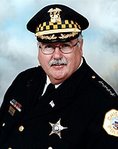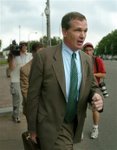$12 million fund would pay victims of job bias
By Dan Mihalopoulos and Todd Lighty, Tribune staff reporters; Tribune staff reporter Mickey Ciokajlo contributed to this report
Chicago Tribune
March 22, 2007
Mayor Richard Daley's administration agreed Wednesday to a settlement that would end court oversight of City Hall hiring and pay millions of dollars to people who lost out because they didn't have the right political connections.
Daley had long sought to end the decades-old federal consent decrees that ban politics from most city personnel decisions, even after aides in his office were convicted last year of rigging hiring to favor pro-Daley political workers.
A court-appointed monitor will continue to help regulate city hiring for two more years. But after June 1, the city's inspector general--appointed by the mayor--will investigate complaints of politically based hiring, firing and promotions, according to the settlement announced in federal court.
The settlement, which requires City Council approval, calls for the mayor to issue an executive order against political hiring.
Michael Shakman, whose lawsuit led to the anti-patronage decrees, said the settlement could end his long legal fight--if City Hall is acting in good faith.
"The mayor has an opportunity here," Shakman said. "He's either going to be remembered by history as the mayor who presided over the last big-city clout machine or the mayor who fixed it. This gives him a chance to fix it."
The city will create a $12 million account for people who claim they have been discriminated against because they lacked clout to get a job, promotion, transfer or overtime. Shakman said he expects thousands to apply for damage awards of as much as $100,000 each.
While Shakman, city officials and the judge in the case hailed the accord as a landmark moment for local political ethics, this is not the first time that the city has vowed to root out the traditional political-machine practice of rewarding allies with jobs.
Some declared patronage dead more than 20 years ago, when Mayor Harold Washington signed the Shakman decree against political hiring. The federal investigation of corruption in the Daley administration shattered that illusion.
Though the Daley administration said it hired based on qualifications alone, federal prosecutors say officials in the mayor's office engaged in a "massive fraud" to get around the Shakman restrictions and enhance the mayor's political power.
The criminal hiring investigation yielded guilty verdicts last year against four former Daley administration officials, including longtime mayoral patronage chief Robert Sorich.
`It's a new day'
Mara Georges, the Daley administration's top lawyer, for years swore in court that the city was abiding by the hiring restrictions. After Wednesday's court hearing, Georges said the agreement would allow Daley "to demonstrate that he is truly committed to reform."
And Daley's chief of staff, Ron Huberman, said skeptics should know that "it's a new day."
The agreement was announced as Daley was traveling in Europe with local business leaders. He has denied any knowledge of wrongdoing in city hiring.
When the hiring scandal broke in 2005, Shakman's lawyers asked U.S. District Judge Wayne Andersen to hold the city and Daley in contempt of the federal hiring decrees. The city had tried to void the decrees, saying they were no longer needed.
The proposed settlement ends Shakman's quest to hold the city and Daley in contempt of the court orders.
The city and the mayor do not admit violating the Shakman decree but decided to settle "solely for the purpose of avoiding prolonged and expensive litigation and the drain on the city's resources and employees' time and energy," according to the settlement.
The city has paid $1.65 million to the monitor, Noelle Brennan, and her lawyers since Andersen appointed her less than two years ago, city officials said.
Brennan will remain to assess claims and approve damage payments for people who can demonstrate they were harmed since Jan. 1, 2000. The claim form will be available at www.shakmanmonitor.com.
Shakman said he and his lawyers would submit bills to the city for their work on the case over 20 years. He estimated the sum would exceed $2 million.
The city also agreed to pay $25,000 each to six current and former city workers who in 2005 joined Shakman's suit as plaintiffs. The workers alleged that their careers in Daley's administration suffered because they lacked the right connections to pro-Daley political organizations. The six workers from the Streets and Sanitation and Water Management Departments could still seek additional money from the $12 million fund.
Under the settlement, most of the nearly 40,000 spots on the City Hall payroll would have to be filled without regard to politics, with about 800 exceptions for policymaking positions.
Under the mayor's order, city employees would have a duty to report political job discrimination to the city inspector general, and they would get protection against retaliation for pointing out problems.
Inspector General David Hoffman would investigate and could recommend potential discipline or file criminal charges.
"This is an important milestone in creating a system of integrity," said Hoffman, appointed by Daley to a four-year term in 2005. "Given the proper resources, we will be able to become a strong, independent watchdog."
Brennan said City Hall eventually would have "an independent system that's within the city."
"We will all see what happens when we go away, but I am optimistic that things really are changing within the city."
In December, Brennan reported that the Daley administration was making strong progress in reforming hiring. Yet she also said she had encountered "pockets of resistance in the city, primarily from those individuals who benefited from the patronage system."
If the city convinces the court that it is in "substantial compliance" with the agreement, the Shakman decree would expire on Dec. 31, 2008.
More than 35-year battle
Shakman has fought City Hall over patronage since 1969, when Daley's father was mayor. As a candidate for the state Constitutional Convention, he said he had no chance against armies of patronage workers loyal to the Cook County Democratic Party.
The party's power withered over time, only for Daley's political organization to supplant it after he became mayor in 1989. Under Daley, the Democratic ward organizations that traditionally dispensed jobs to political workers became less significant.
Witnesses in the Sorich trial detailed how Daley aides instead funneled patronage through new pro-Daley groups such as the Hispanic Democratic Organization.
Regardless of the settlement in Shakman's civil case, it appears unlikely that the criminal investigation of hiring fraud is over. After Sorich's conviction, prosecutors warned they would pursue higher-ups in the Daley administration who participated in the scheme.
In the courtroom Wednesday, two prosecutors who have probed City Hall corruption observed the proceedings from the back row. Assistant U.S. Attys. Philip Guentert and Manish Shah declined to comment.
----------
dmihalopoulos@tribune.com | tlighty@tribune.com
Chicago Tribune
March 22, 2007
Mayor Richard Daley's administration agreed Wednesday to a settlement that would end court oversight of City Hall hiring and pay millions of dollars to people who lost out because they didn't have the right political connections.
Daley had long sought to end the decades-old federal consent decrees that ban politics from most city personnel decisions, even after aides in his office were convicted last year of rigging hiring to favor pro-Daley political workers.
A court-appointed monitor will continue to help regulate city hiring for two more years. But after June 1, the city's inspector general--appointed by the mayor--will investigate complaints of politically based hiring, firing and promotions, according to the settlement announced in federal court.
The settlement, which requires City Council approval, calls for the mayor to issue an executive order against political hiring.
Michael Shakman, whose lawsuit led to the anti-patronage decrees, said the settlement could end his long legal fight--if City Hall is acting in good faith.
"The mayor has an opportunity here," Shakman said. "He's either going to be remembered by history as the mayor who presided over the last big-city clout machine or the mayor who fixed it. This gives him a chance to fix it."
The city will create a $12 million account for people who claim they have been discriminated against because they lacked clout to get a job, promotion, transfer or overtime. Shakman said he expects thousands to apply for damage awards of as much as $100,000 each.
While Shakman, city officials and the judge in the case hailed the accord as a landmark moment for local political ethics, this is not the first time that the city has vowed to root out the traditional political-machine practice of rewarding allies with jobs.
Some declared patronage dead more than 20 years ago, when Mayor Harold Washington signed the Shakman decree against political hiring. The federal investigation of corruption in the Daley administration shattered that illusion.
Though the Daley administration said it hired based on qualifications alone, federal prosecutors say officials in the mayor's office engaged in a "massive fraud" to get around the Shakman restrictions and enhance the mayor's political power.
The criminal hiring investigation yielded guilty verdicts last year against four former Daley administration officials, including longtime mayoral patronage chief Robert Sorich.
`It's a new day'
Mara Georges, the Daley administration's top lawyer, for years swore in court that the city was abiding by the hiring restrictions. After Wednesday's court hearing, Georges said the agreement would allow Daley "to demonstrate that he is truly committed to reform."
And Daley's chief of staff, Ron Huberman, said skeptics should know that "it's a new day."
The agreement was announced as Daley was traveling in Europe with local business leaders. He has denied any knowledge of wrongdoing in city hiring.
When the hiring scandal broke in 2005, Shakman's lawyers asked U.S. District Judge Wayne Andersen to hold the city and Daley in contempt of the federal hiring decrees. The city had tried to void the decrees, saying they were no longer needed.
The proposed settlement ends Shakman's quest to hold the city and Daley in contempt of the court orders.
The city and the mayor do not admit violating the Shakman decree but decided to settle "solely for the purpose of avoiding prolonged and expensive litigation and the drain on the city's resources and employees' time and energy," according to the settlement.
The city has paid $1.65 million to the monitor, Noelle Brennan, and her lawyers since Andersen appointed her less than two years ago, city officials said.
Brennan will remain to assess claims and approve damage payments for people who can demonstrate they were harmed since Jan. 1, 2000. The claim form will be available at www.shakmanmonitor.com.
Shakman said he and his lawyers would submit bills to the city for their work on the case over 20 years. He estimated the sum would exceed $2 million.
The city also agreed to pay $25,000 each to six current and former city workers who in 2005 joined Shakman's suit as plaintiffs. The workers alleged that their careers in Daley's administration suffered because they lacked the right connections to pro-Daley political organizations. The six workers from the Streets and Sanitation and Water Management Departments could still seek additional money from the $12 million fund.
Under the settlement, most of the nearly 40,000 spots on the City Hall payroll would have to be filled without regard to politics, with about 800 exceptions for policymaking positions.
Under the mayor's order, city employees would have a duty to report political job discrimination to the city inspector general, and they would get protection against retaliation for pointing out problems.
Inspector General David Hoffman would investigate and could recommend potential discipline or file criminal charges.
"This is an important milestone in creating a system of integrity," said Hoffman, appointed by Daley to a four-year term in 2005. "Given the proper resources, we will be able to become a strong, independent watchdog."
Brennan said City Hall eventually would have "an independent system that's within the city."
"We will all see what happens when we go away, but I am optimistic that things really are changing within the city."
In December, Brennan reported that the Daley administration was making strong progress in reforming hiring. Yet she also said she had encountered "pockets of resistance in the city, primarily from those individuals who benefited from the patronage system."
If the city convinces the court that it is in "substantial compliance" with the agreement, the Shakman decree would expire on Dec. 31, 2008.
More than 35-year battle
Shakman has fought City Hall over patronage since 1969, when Daley's father was mayor. As a candidate for the state Constitutional Convention, he said he had no chance against armies of patronage workers loyal to the Cook County Democratic Party.
The party's power withered over time, only for Daley's political organization to supplant it after he became mayor in 1989. Under Daley, the Democratic ward organizations that traditionally dispensed jobs to political workers became less significant.
Witnesses in the Sorich trial detailed how Daley aides instead funneled patronage through new pro-Daley groups such as the Hispanic Democratic Organization.
Regardless of the settlement in Shakman's civil case, it appears unlikely that the criminal investigation of hiring fraud is over. After Sorich's conviction, prosecutors warned they would pursue higher-ups in the Daley administration who participated in the scheme.
In the courtroom Wednesday, two prosecutors who have probed City Hall corruption observed the proceedings from the back row. Assistant U.S. Attys. Philip Guentert and Manish Shah declined to comment.
----------
dmihalopoulos@tribune.com | tlighty@tribune.com




No comments:
Post a Comment